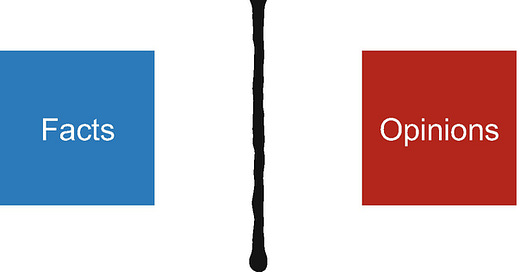Most people are philosophically confused about lots of things. This includes elementary and middle school teachers. As a result, a large number of students are being taught a horrendously confused distinction between facts and opinions. Worse, it gets them to imbibe a kind of naive subjectivism cooked up in the darkest recesses of hell Richard Rorty’s mind.
It’s often said of some controversial view that it is “just your opinion.” For instance, when you start threateningly fulminating against people for their excessive shrimp consumption combined with their pernicious failure to donate to shrimp, they say “but that’s just like your opinion man.”
Or when you express the view that, say, immigration restrictions are bad for the U.S. economy, they’ll say things like “well you have your opinion and I have my opinion.” But what, precisely, is this supposed to mean?
To figure this out—and figure out what philosophically-inane nonsense is being taught to elementary school kids—I decided to go to an education tutoring website that attempted to explain the distinction. When I did, a little bit of my soul died (and yes, that is a fact, not an opinion. As Socrates famously proved, the soul has various different parts).
A fact is a statement that can be verified. It can be proven to be true or false through objective evidence.
An opinion is a statement that expresses a feeling, an attitude, a value judgment, or a belief. It is a statement that is neither true nor false. Or it may feel true for some, but false for others.
But this definition seems to confusedly kluge together several different meanings. One of them is verificationism—according to which facts are those things that can be verified. This is a totally ridiculous account of what a fact is. Suppose that last year there were 100 trillion mosquito bites. Then it would be a fact that last year there were 100 trillion mosquito bites; this would be so even if no one was in a position to verify it!
In fact, this definition is self-defeating. “Facts are things that can be verified,” cannot itself be verified. Riemann’s hypothesis cannot yet be verified. By this definition, it is not a fact—but if someone proves it later it will be.
We don’t need all this hand-wringing about what a fact is. The true definition is quite a bit more simple and straightforward: a fact is something that is the case. It is a fact that there are trees, because it is the case that there are trees. It is a fact that the self-indication assumption is right, because the self-indication assumption is right. It is a fact that “P” if and only if “P.” Verification is irrelevant.
Then, when we get to their discussion of opinions, things go more off the rails than a train in East Palestine. An opinion apparently is a statement that expresses a feeling or attitude or value judgment. We are told “It is a statement that is neither true nor false. Or it may feel true for some, but false for others.”
Now, first of all, something cannot be neither true nor false and also true for some and false for others. Neither A nor B isn’t true if sometimes A! Second of all, I have no idea why the author of this thinks that non-cognitivism is so trivially true that it can be blithely asserted and taught to elementary schoolers without argument.
Third of all, “feeling,” is just as vague a term as opinion. People sometimes have a feeling that, say, something bad will happen. Now, sometimes bad things do, in fact, happen. If someone said before the 2024 election “I have a feeling that Trump will win,” is that a fact or an opinion?
Also, confusingly, a statement expressing a feeling is, in fact, verifiable. If I say “I feel sad about shrimp farming,” you can actually verify that! Now, feelings themselves are not statements and are not thought to be opinions—if a person feels general ennui, that is usually not thought to be an opinion.
Fortunately, the authors have some helpful indicators of whether something is a fact or opinion:
Relying on “denotative language,” is not helpful because what it is for some language to denote is quite similar for what it is for it to express a fact. It’s worryingly circular. And why are value judgments supposed to be opinions rather than facts? Moral statements denote. When one says that the holocaust was immoral, they are not generally expressing the mere fact that they are not fond of the holocaust. They purport to be saying something about the holocaust’s immorality. Only if one has bought into Propaganda From Big Subjectivist do they think it’s just totally trivial that value statements are opinions—in some way dubious, non-factive, and unverifiable.
Also, what do they mean that an opinion can mean different things to different people? If someone says “that’s a cool car,” that does not, in fact, mean different things to different people—provided that the different people speak English.
The article then gives a list of statements that you’re supposed to exercise your fact vs. opinions muscle by figuring out.
1. I have a husband and two children.
2. Pit bulls are the most dangerous dogs alive.
3. Ostriches do not hide their head in the sand.
4. There is nothing like an ice-cold bottle of Coke to satisfy a thirst!
5. It is time for educators to assume more responsibility for schools’ unhealthy lunch menus.
6. The government should increase spending for preventing unwanted pregnancy; more than one million teenagers become pregnant every year.
7. Rob said that the book Angels and Demons is better than The Da Vinci Code.
8. New York City is not the capital of New York State.
Now, you might have noticed something odd about this list: many of the things that are on the list are neither fact nor opinion. They are instead false! Ostriches do hide their head in the sand. The article goes on to clarify:
A false fact is still a fact: A majority of experts agree that smoking daily can improve your health.
Um, no. That is not a fact because it is false. It is not, for instance, a fact that the holocaust didn’t happen. What the hell is this person saying? Why do they think this? Why would anyone think false statements are facts? This is not common usage—it’s just a weird norm dreamt up by postmodern neomarxists in a fever dream, designed to subvert the true, just, good, and beautiful.
Predictions are opinions because they cannot be verified right now: By the year 2025, Americans will have socialized medicine.
What precisely do they mean by verify? It also can’t be verified, in the sense required, that the Earth is more than five minutes old—rather than created five minutes ago with false memories. Nonetheless, that is clearly a fact! Facts don’t need to be true or even reasonable to believe. They just need to be the case!
And besides, most of these statements are just poetic ways to express personal preferences. For instance, “There is nothing like an ice-cold bottle of Coke to satisfy a thirst!,” means something like “my thirsts are most—or near-most—efficiently satisfied by ice-cold bottles of coke.” But that is a matter of fact! One could be wrong about that! Perhaps the speaker is some dumbass who forgot about the existence of water and would, in fact, have their thirst more efficiently quenched by water.
Now, maybe the idea is just that an opinion is a statement relative to a speaker. But surely that will not do. A proposition like “I’m in Paris,” will be speaker relative. If I uttered it, it would be false—if someone in Paris uttered it, it would be true. But this doesn’t mean that it’s an opinion, surely!
Perhaps the least confused way of saving the distinction is that an opinion is a statement that is true subjectively—so, for instance, if in fact beauty is subjective, then the statement “the Shrimp Welfare Project’s banner image is beautiful,” would be subjectively true. It’s widely recognized at the very least that gustatory facts—facts about what’s tasty—are subjective. So maybe opinions are just subjective facts.
If one wants to use opinion this way, I would have no major objection. But normally how it is used is to weirdly blur the line between certain privileged factual questions on the other hand, and a class of other purported facts (e.g. moral and aesthetic ones) that are in ill repute. Usually it is done with such a high dose of confusion that it would be sufficient to kill an elephant.
Additionally, as used this way, there are almost no uncontroversial instances of opinions. It is most-always debatable whether some judgments is objectively true, subjectively true, or false. Even gustatory subjectivism is somewhat controversial—gustatory judgments may be some subset of aesthetic judgments which are often thought to be real. It doesn’t seem crazy that if a person who loved eating poo uttered the sentence “poo is delicious,” they’d be speaking falsely.
So stop talking about facts vs. opinions especially if you are an elementary school teacher. Otherwise your students will get irritated by the confusion, stew on their irritation for 13 years, and then write a blog post leveling the distinction.






There are usages of the fact/opinion distinction that I think are pretty sensible. In defamation law, you need to make a false statement of fact to defame someone. You can defend yourself against a charge of defamation by arguing that what you said was true, but also by arguing that it was an expression of opinion rather than a statement of fact.
It's hard to nail down just how this works, but verification is definitely a big part of the story.
Here's a way to put it as a challenge. Do you think we shouldn't punish people for falsely saying other people have sex with children? Or do you think we should punish people for falsely calling other people assholes? If you think the status quo is fine--yes, punish people for calling people pedophiles, but don't punish people for calling people assholes--then you will probably end up recreating something a lot like the fact opinion distinction in justifying that distinction.
Who is the hypothetical student here, who knows what “denotative language” and “objective evidence” are, but needs some help understanding the words “fact” and “opinion”?